Rossa O’Keeffe-O’Donovan, Assistant Director of Oxford University’s Global Priorities Institute (GPI), gives a high-level introduction to global priorities research (GPR). He discusses GPI's research plans, and which other organizations are doing GPR. He also offers some thoughts on how students can find out more about GPR.
Below is a transcript of Rossa’s talk, which we’ve lightly edited for clarity. You can also watch it on YouTube and discuss it on the EA Forum/read it on effectivealtruism.org.
The Talk
Bridget Williams (Moderator): Hi, everybody, and welcome to this introduction to global priorities research with Rossa O'Keeffe-O'Donovan. My name is Bridget and I'll be the emcee for the session.
To start off, we'll have a 20-minute talk by Rossa, and then we'll move to a live Q&A session where he'll respond to some of your questions. [...]
But now, I'd like to introduce our speaker for this session. Rossa O'Keeffe-O'Donovan is a post-doc in economics at the University of Oxford and Assistant Director at the Global Priorities Institute. He previously studied philosophy, politics, and economics as an undergraduate, worked for a development charity and economics consultancy, and completed a master's and PhD in economics. Here's Rossa.
Rossa: Thanks very much for coming to this session. I'm Rossa O'Keeffe-O'Donovan. I'm the Assistant Director at GPI [Global Priorities Institute], in charge of building the economics research team. I'm also an economist at the University of Oxford, where I'm a postdoctoral researcher.
Today I want to give an introduction to global priorities research. I'll start off by discussing what I think global priorities research is [and how] this is a somewhat contested definition. Then I'll talk about which organizations work in this space. And finally, I'll add a few thoughts about what you might do if you're a student who's interested in global priorities research.
I shall also [provide] a disclaimer: Everything I talk about represents my own views, rather than the views of GPI or the University of Oxford.
What is global priorities research?
I think it's important to know that there's no single definition. So I've [included a few on this slide], but there are others out there.
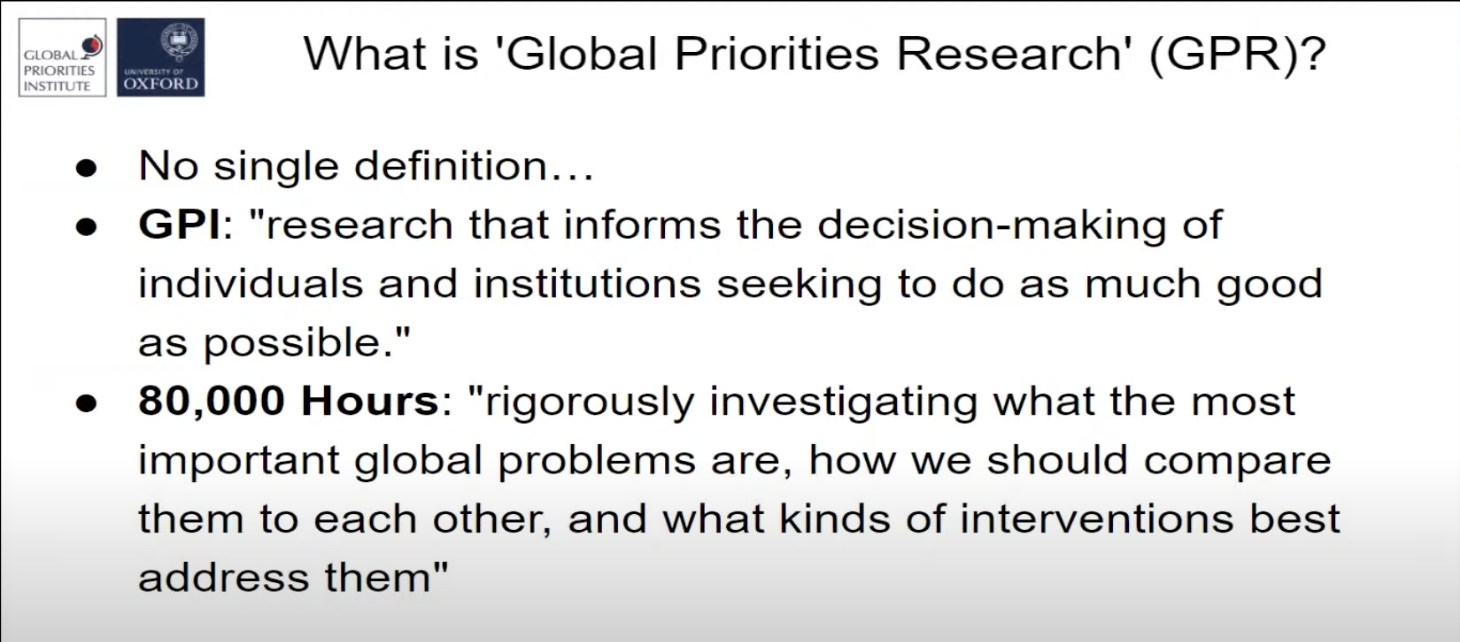
The first is GPI's definition from our website. We think global priorities research is research that informs the decision-making of individuals and institutions seeking to do as much good as possible.
80,000 Hours says that global priorities research is research about “rigorously investigating what the most important global problems are, how we should compare them to each other, and what kinds of interventions best address them”.
Those are two different definitions. But there are other organizations that have a slightly different definition of global priorities research. And we're going to spend the first few minutes talking about my own views about what global priorities research is — and what it isn't.
The first thing to say is that global priorities research is not the same as cause prioritization research, at least in my opinion. I think the best way to think about this is [represented by] this Venn diagram on the left.
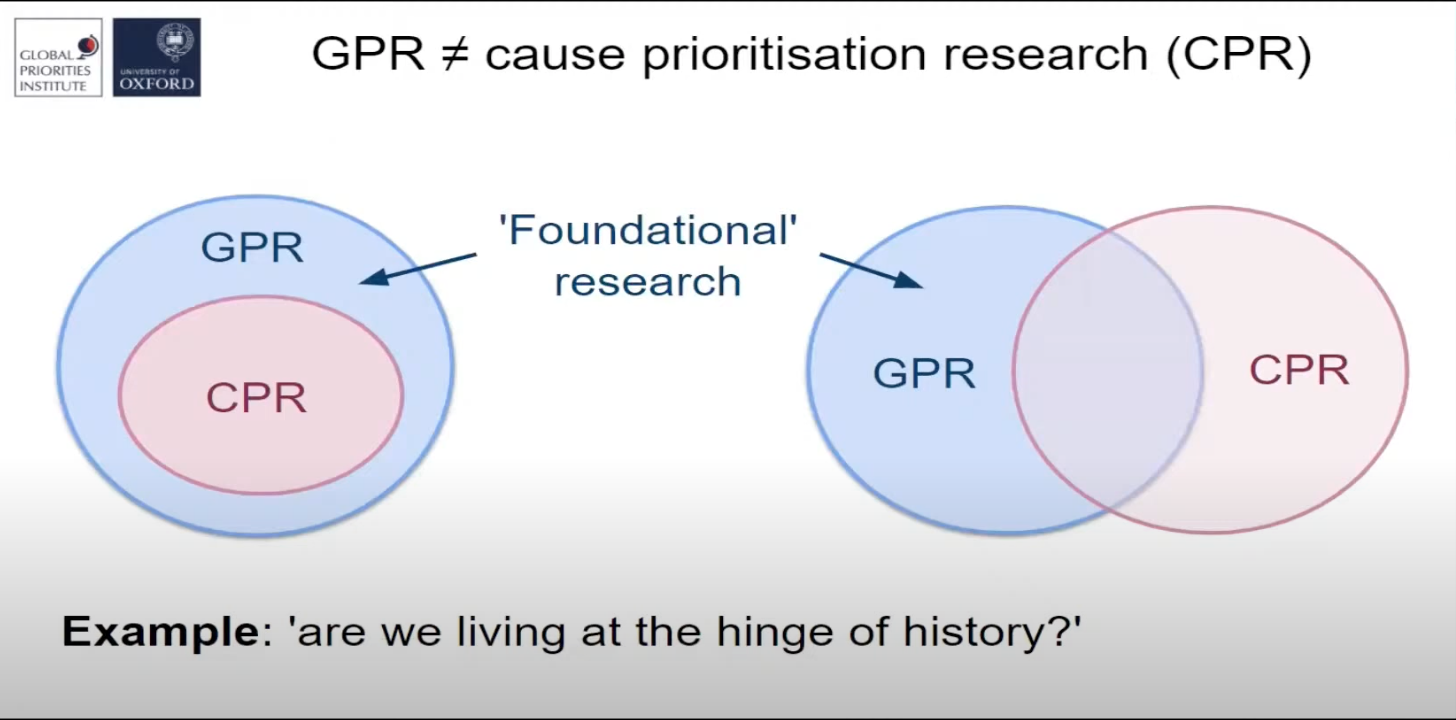
This is closest to my own view of cause prioritization research as a subset of global priorities research.
The idea here is that there are some topics that might kind of fit under global priorities research which don't really require you to compare the effectiveness of different causes. What I have in mind here is a topic I've called “foundational research.”
An example of this is the question: “Are we living at the hinge of history?” If you did some research to try to better understand this question, that would help you figure out what the best actions you can take might be. But it's not about directly comparing and prioritizing different causes. [This is a way in which] I think global priorities research is distinguished from cause prioritization research.
Other people might use the Venn diagram on the right. They might say, “Well, cause prioritization research and global priorities research overlap in the middle, but there are some topics — maybe foundational research topics — that are GPR or global priorities research, and some which are cause prioritization research but not global priorities research. I think that would be a pretty reasonable view as well. But for me the two things are not exactly equal to each other.
The second thing to say is that global priorities research is not the same as what GPI works on. I want to be quite clear on this, because global priorities research is bigger than GPI; GPR is not just a subset of questions that GPI has chosen to focus on.
So, I have this other Venn diagram showing that GPI is kind of a subset of all of the global priorities research that could be, should be, and is happening in the effective altruism movement, as well as other areas.
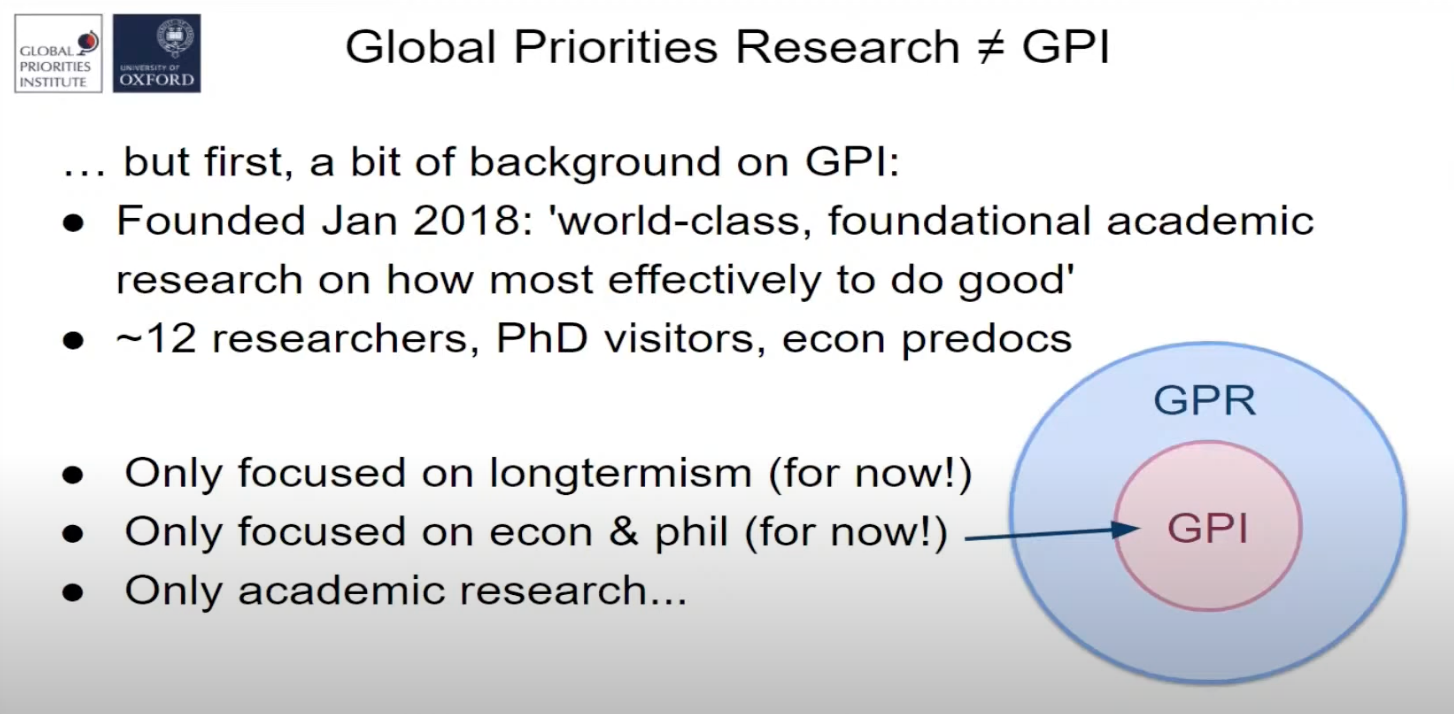
Before going into more detail on that, I think I should give a bit of background on GPI. We were founded in January 2018. Our mission statement, as our website says, is to do world-class, foundational, academic research on how to do good most effectively.
We have about 12 full-time researchers at the moment. We’re also trying to cultivate a network of other people who are doing research in academia relevant to the question of how to do good most effectively. And then we have a few programs to engage with students or recent graduates in various ways.
One is the PhD visitors program we offer each summer. We call it the Early Career Conference Programme. For the other program we offer, we employ economics predoctoral researchers or predoctoral research fellows. The idea there is for recent graduates — especially those who have taken economics as part of their undergraduate studies — to come and work at GPI for a year or two. They get some experience doing global priorities research; some of it is research assistant work, and some is independent research. The hope is that it sets them up well to go on to do graduate research. This is why we call it a predoctoral research fellowship.
[Let’s] zoom back in on this question of what global priorities research is, and my argument that it's not defined by what GPI focuses on. I think there are three key aspects to this:
- GPI focuses quite narrowly on research questions related to longtermism, [at least for] the time being. This is partly a tactical decision. Having a relatively narrow research focus allows different researchers to build on each other's ideas. It's also because we think research on longtermism is just really important, and that there's quite a lot that can be contributed by doing high-quality academic research related to it. So that's our focus for now, but I think there is global priorities research that can or should be done on topics that aren't related to longtermism.
- We only focus on economics and philosophy. Again, this is for the time being and probably the next few years. We anticipate that we might expand into other fields as the years go by and GPI grows.
- We focus only on academic research.
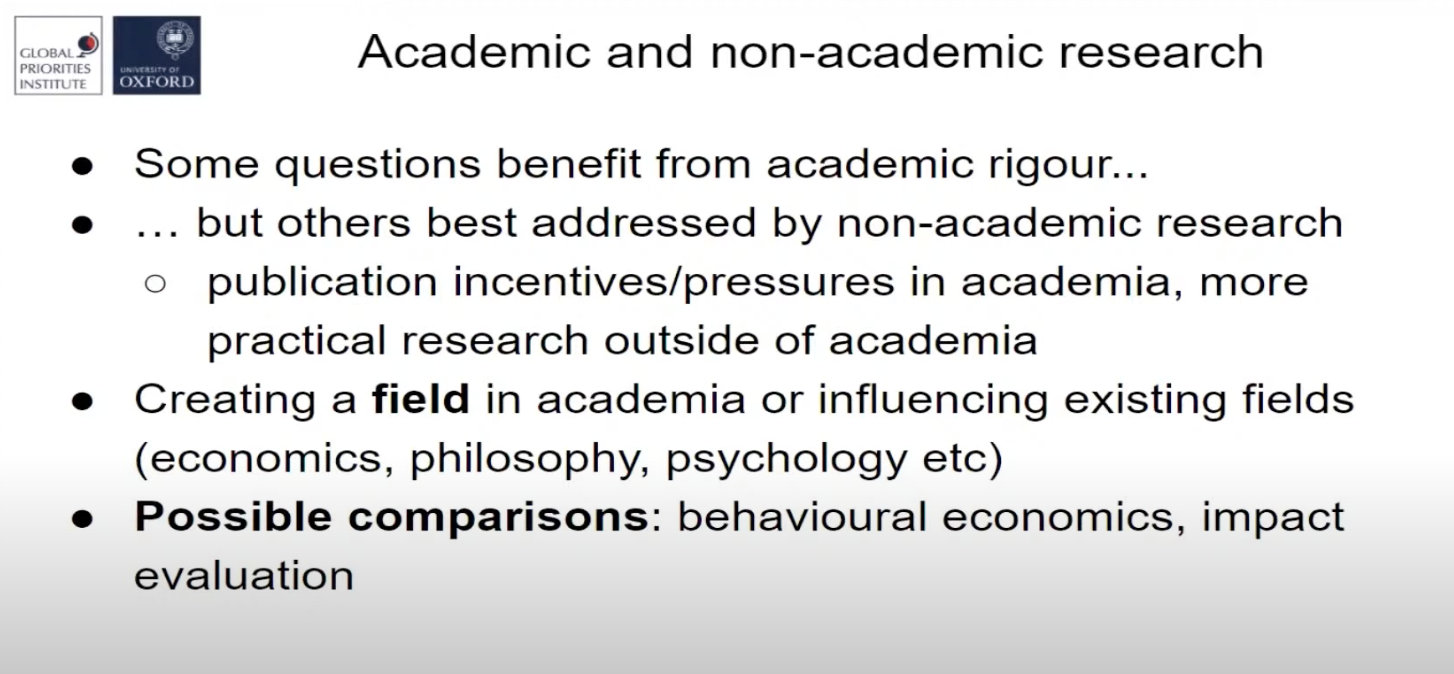
Let me talk a little bit more about this third aspect, because I think it’s quite an important point to make, and also possibly a bit of a misperception within the effective altruism community. My personal view is that global priorities research includes — and should include — both academic research and non-academic research. GPI was set up to focus on the former, and the idea is that there are some questions that might be very useful for helping people to do as much good as they can, and that benefit from an academically rigorous approach.
In academia, we have the luxury of spending a lot of time thinking about a research question. We develop a hypothesis through the academic process of giving seminar presentations, writing drafts, and getting a lot of feedback on the drafts. And it can take months, possibly years. In economics, it's quite common for papers to take a number of years before we have a finished product. Some [economists] would argue that our product is never finished.
We think there are some really important questions that require and benefit from that level of academic rigor. A very good example is Hilary Greaves and Will MacAskill's paper “The Case for Strong Longtermism.”
But I think there are other questions to do with global priorities research that are best addressed by non-academic research. I have a few points to make on this:
- In academia, we have incentives to publish in prestigious journals. There are pressures that come with that, and it can change some of the topics that you work on. But this isn't always true for GPI. We will work on papers that we think aren't likely to be published in extremely prestigious journals if we think they're important enough. (The reason they might not be published is if they’re on topics outside the scope of mainstream academia.) Sometimes we work on those papers because we think that the question requires a level of rigor that is typical of academia [...] and we think the question is going to be extremely important for actors who are trying to do as much good as they can.
- The second point I want to make on the difference between academic and non-academic GPR is that sometimes non-academic research can be closer to the decision-maker. It could be more practical. So again, here in academia, because we have certain methodologies, and because we want to try to publish some of our research, we want to use certain types of research that are possibly more foundational but less decision-relevant for people who might be trying to do good. They might be policymakers. They might be philanthropists. And so I think global priorities research should happen (and is happening) outside of academia to address those questions.
Within academia, I think there's also a bit of a debate about what “global priorities” should become. We talk about this at GPI. We sometimes ask, “Are we trying to create a field [called] ‘global priorities research’, or are we merely trying to influence a number of existing fields to work on questions that we think are very important for people trying to do good?”
I think that one possible comparison is behavioral economics. Over the last 20 to 30 years, behavioral economics has developed into its own field, [which] sits between economics and psychology. I think it’s possible that global priorities research will evolve to that state where we will be seen as our own field. That might be very useful, because behavioral economics has become very influential for policymakers and academics alike.
But on the other side of the argument, global priorities research draws from many different existing fields: economics, philosophy, psychology, and several others. We contribute to those fields, or we hope to, and we use [many of the same tools as] them. And so it might not make sense for global priorities research to be seen as its own field. Maybe it makes more sense for it to be seen as contributing to these existing fields.
One other possible comparison I want to make is with the area of impact evaluation. I don't think you would consider impact evaluation to be a “field” — not in the academic sense — but it's an area of research where both academic and non-academic research are happening. (And I'm talking about impact evaluation mostly in development economics, because that’s the area I know best.) The foundations of impact evaluation were laid in academic research, but now a lot of the research is going on outside of an academic setting. I think global priorities research will evolve into a similar type of field, with some of the work going on in academic settings, and some in non-academic settings.
Organizations working in global priorities research
I’ve spoken a bit about the Global Priorities Institute. I want to mention a few other organizations that are working in GPR. I won't spend long talking about these, in part because people from many of them are also speaking at this conference, and so you should go and check out those talks to learn a bit more about them.
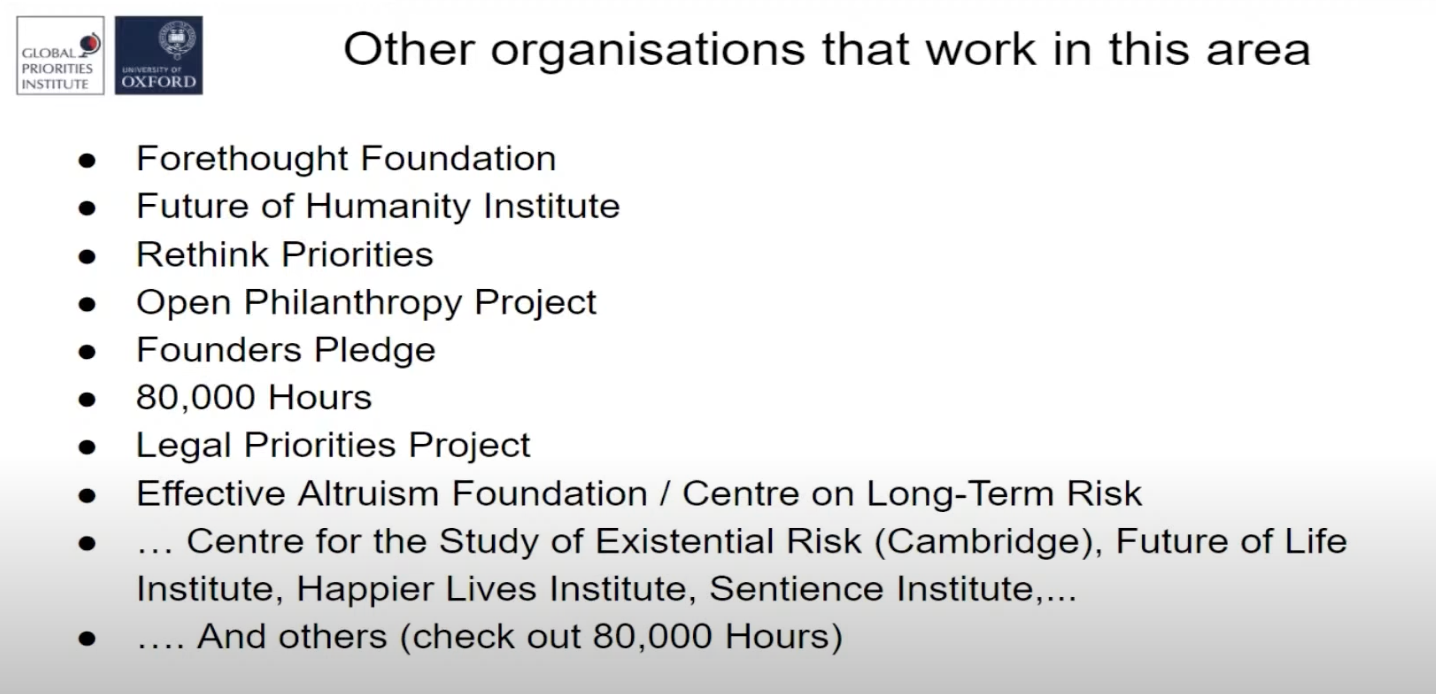
The Forethought Foundation is somewhat of a partner Institute for GPI. [Like GPI], they focus on longtermism, are trying to develop a network of academic researchers who work in this area, and are largely focused on economics and philosophy. But they have a slightly broader focus than GPI. They run some scholarships and offer a thesis prize for undergraduates. I'll talk about that in a bit more detail shortly.
We know the Future of Humanity Institute quite well because they're also based in Oxford and they also focus on questions related to longtermism. They have a number of sub-teams that work on various projects.
Rethink Priorities has typically focused on questions related to animal welfare. But I understand they've hired a few more researchers [in other fields] recently, including some economists. Dave Rhys Bernard is [presenting later in this conference]. As they've expanded their research team, I think they are likely to expand their research focus as well. [Regardless], they've clearly been doing work that I think is part of global priorities research.
Open Philanthropy, which I think many of you will know quite well, typically doesn’t do academic research, although sometimes I think they produce work that could be called that. And they've clearly made a lot of progress in global priorities research, [providing] answers to questions that are very relevant for people trying to do the most good.
I won't talk about the following organizations, but to varying degrees, they do research that is part of GPR:
- Founders Pledge
- 80,000 Hours
- The Legal Priorities Project (a new organization that Cullen O'Keefe will speak about at this conference)
- The Effective Altruism Foundation
There are several others. I'm sure I've missed some organizations out there, so I apologize for that. To see who else is working in global priorities research, I think the best place to go is probably 80,000 Hours.
Recommendations for students interested in global priorities research
This conference is partly designed to give you some ideas about what you can do if you're interested in various subjects. And so now I’d like to share a few thoughts on what you can do if you're a student who’s interested in global priorities research.
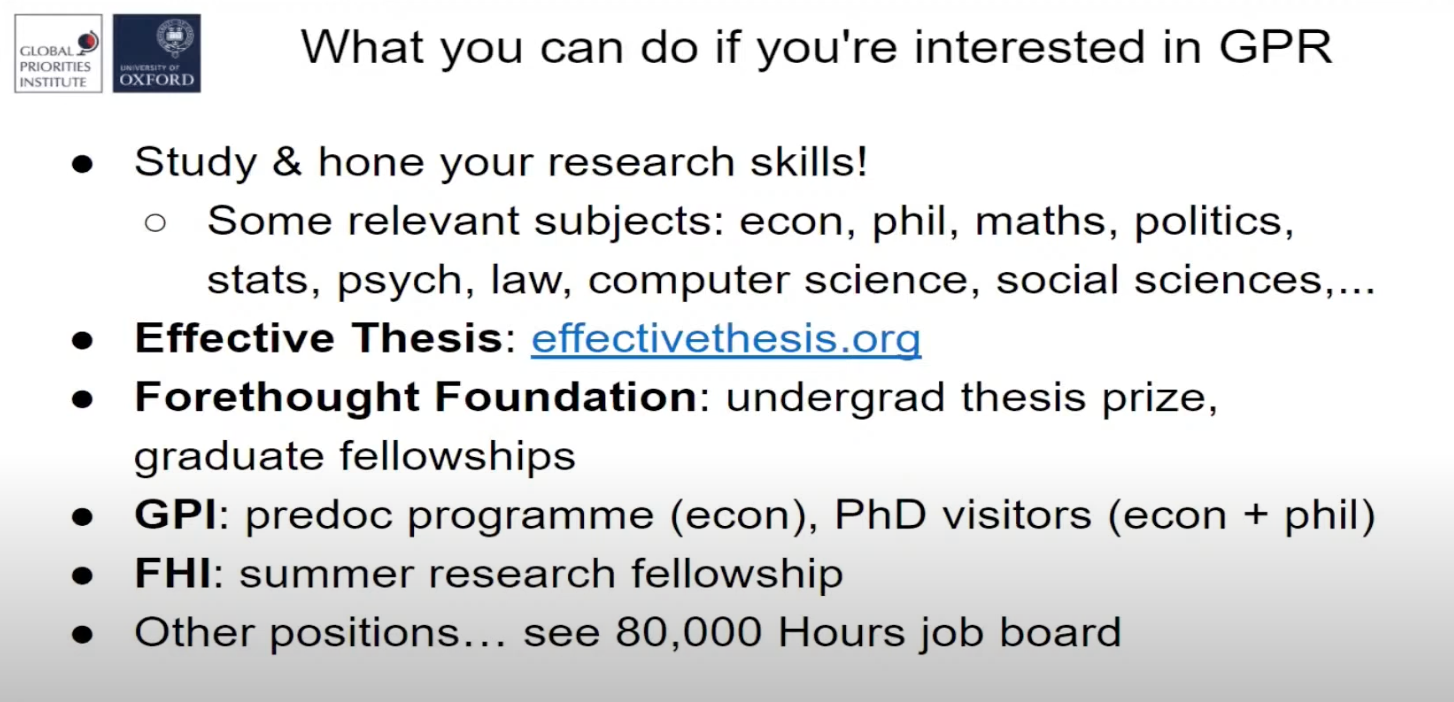
So I think the first thing is to study and hone your research skills, [and get some experience doing high-quality research]. This might seem obvious, but I think it's actually pretty important.
I've listed some relevant subjects here. So if there are some freshmen in the US system or people thinking about applying to various undergraduate or graduate programs, I think some quite clearly relevant subjects are economics, philosophy, maths, politics, statistics, psychology, law, computer science, and other social sciences. But there are probably others as well.
Another organization I wanted to give a shout out to is Effective Thesis. Their website is effectivethesis.org. Whether you're an undergrad or a graduate student, if you're looking for a topic to do your thesis on, they've looked for research questions that are both [feasible for students to work on] and would really contribute to global priorities research. Do check that out if you're looking for a thesis topic.
I'll mention a few other opportunities that might be relevant for people interested in this area. The Forethought Foundation awards an undergraduate thesis prize. I think they announced their [2019-2020] winners for the latest rounds. Those [winners] earn graduate fellowships at GPI. And I previously mentioned that GPI has a predoctoral program [the Early Career Conference Programme]. It's only for economists at the moment. And then we have some PhD visitors in economics and philosophy each summer.
[FHI offers] a summer research fellowship, and I think that is broader in terms of the fields that they cover. And there are several other positions, I'm sure, so check out the 80,000 Hours job board if you're interested in working in this area. They have a filter that allows you to search for opportunities in global priorities research.
[Rossa goes on to mention what conference attendees can do at the conference to learn more about global priorities research. Here are specific talks he recommends]:
- Which cause to work on?
- Lightning talks: global priorities research
- Moral standing and cause prioritization
- Gentle Bayesian updating
- Decoupling: a technique for reducing bias
- Evidence, cluelessness, and the long term
I’ll end with this slide:
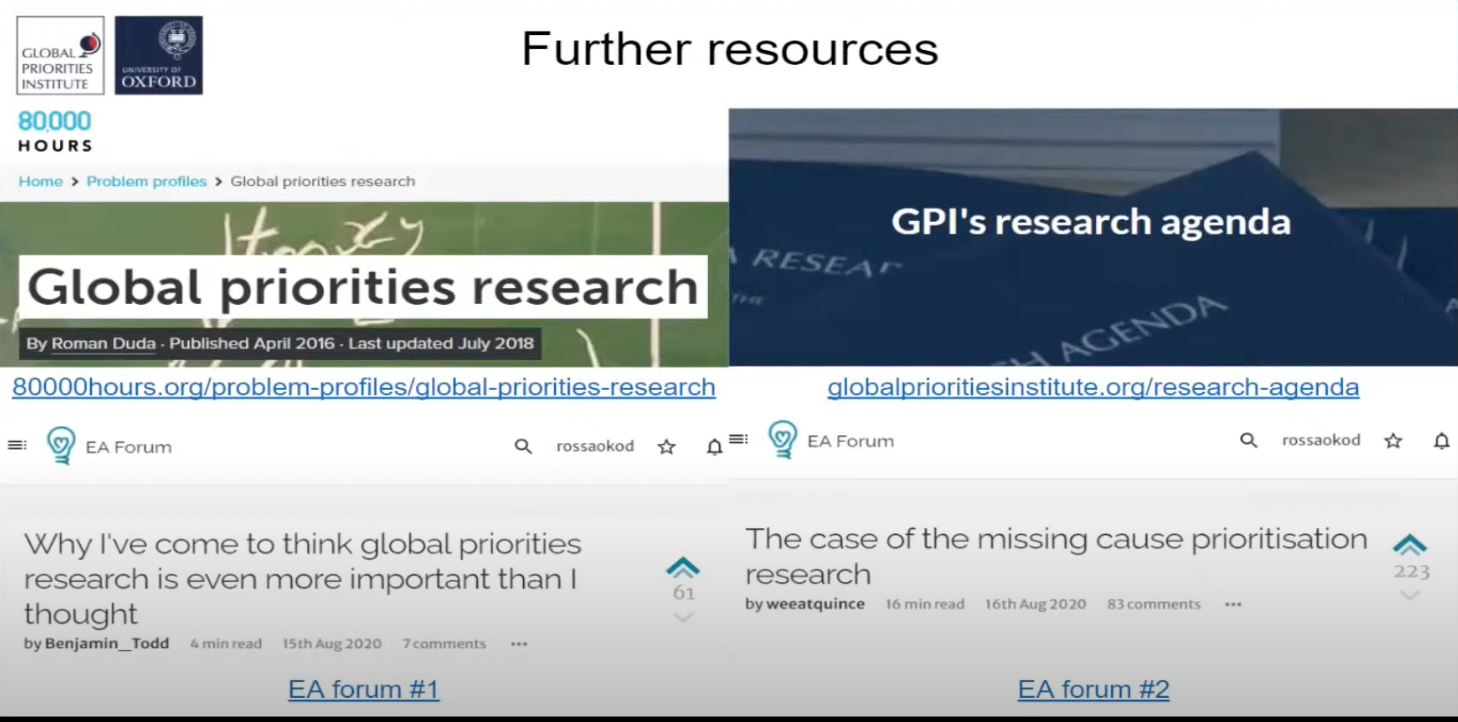
I think of all the resources out there, these are the four that I'd most recommend you look at:
- 80,000 Hours’ webpage on global priorities research
- GPI's research agenda: We just published a new version. It's not a major update, but it [now describes] some of the research that we've done over the last 18 months.
- An EA Forum post: “Why I’ve come to think global priorities research is even more important than I thought”
- Another EA Forum post: “The case of the missing cause prioritisation research”
I think these two posts on the EA Forum about global priorities research are particularly high-quality and discuss some of the issues related to why global priorities research might be very important, and the types of global priorities research (or cause prioritization research) that may not be happening and which will be very valuable for people to do.
I'm going to leave it there. Thanks very much for coming to this session. And I look forward to taking your questions. Cheers.
Q&A
Bridget Williams: Thanks so much for that talk, Rossa. It was really interesting and it's great to have you here for this live Q&A. And I see you've also been one of the most efficient speakers ever; you've already been answering questions [in the online chat], which is great because there are heaps, and it's good to get through them. Thank you for that, and welcome.
Rossa: Thanks very much, Bridget.
Bridget: So, I think we'll just jump straight into it. One question I have is: What questions would you be most excited to see people work on in this field?
Rossa: Thanks very much. And thank you for the questions. I'll try to get to all of them.
Bridget, in terms of what we're most excited to see, I'm going to use this opportunity to plug the fact that GPI recently posted a research standard. It's not entirely new, but it has some updates, particularly on the economics side.
I should also caveat that my answer is going to be more economics-focused because I'm an economist. I don't know as much about what we're excited to see [explored] on the philosophy side, or in other fields.
I’ll highlight three areas which are new additions to our research agenda:
- The first is to do with institutions. This is an area that GPI is particularly interested in from a longtermist perspective, largely because there's some research in economics and economic history which shows that there are very long-run, persistent effects of institutions. Therefore, one way you might reliably or predictably influence the far future is through changing or redesigning institutions today. This is something we haven't researched much, but we're actively considering expanding into it in the next few years. We're doing a bit of exploration research internally at GPI on what that research agenda might look like.
- Long-run forecasting is another area we’re interested in. Philip Tetlock’s style of work [entails making] forecasts on a shorter time frame. To what extent can we extend that over a longer time frame? In the short-term instance, you might look ahead 20 or 30 years, but we're very interested in policies or actions with effects that we might be able to predict over much larger time scales — maybe hundreds of years, or possibly even thousands of years. That's something that's very difficult, and we're not sure how much progress we're going to be able to make on it. But we're keen to see more thinking in that area.
- We're also excited to see more work done on how we can affect long-run growth, and the effects on it of things like new technologies. This speaks to the arguments about whether we should have broad-based policies that try to improve growth more generally for the long run or focus on more specific ways of trying to improve the long-term future.
Bridget: Cool. That all sounds really interesting, and [it will be] exciting to see what comes from it.
As you mentioned, GPI's focus is very much on longtermism and the long-term future. I think there's a really interesting question here [from the audience] about whether you'd be interested in research that was more skeptical of longtermism. Is that something that you'd like to see done?
Rossa: Yeah, definitely. That's a really good question and I was glad that someone raised it in the chat. I think there is a bit of a misperception that GPI is, to some extent, the defender of longtermism, where we're trying to push the idea that longtermism is the most important cause area. And I don't think that's the case. We're very much focusing our research on longtermism, but the reason we’re doing that is to better understand the arguments for and against it, and its implications if it is correct in some form.
I won't speak for the philosophy research team in terms of details, but I know that they're very interested in finding out more about which different views of the world would support longtermist conclusions. They're actively trying to encourage that. And actually, some of the papers that the philosophy team at GPI are writing explore how robust longtermist reasoning is [in the face of] different assumptions, worldviews, or philosophical models.
On the economic side, we're also keen to see skeptical research — especially on the question I mentioned before about how much we can actually predict the effects of our actions in the very long run. I think it's quite natural for economists to be skeptical about that because we're not great at forecasting things even a few years out, let alone hundreds or thousands of years out.
Actually, Christian Tarsney, who is on our philosophy team, wrote a paper exploring a potential flaw in longtermism. So we're definitely keen to see more research on that on the economics side, as well as in other fields. I'm focusing a lot on economics and philosophy — they're the fields I know the best — but we'd also be interested in research which is skeptical of longtermism and really tests the strength of the longtermist argument and its implications.
Bridget: Cool. We only have time for one more question, but there are a few questions in the chat around how a student can set themselves up to get involved in global priorities research, either as an undergraduate or as a graduate. Do you have any suggestions?
Rossa: Yeah, I think it's a really good question, and so I had a slide on this topic. I'll just reiterate a few things. I think probably the best way, if you're an undergraduate or a graduate student, is to start trying some of the research yourself.
If you have the opportunity to do a thesis — especially if it's in a topic relevant to global priorities research or longtermism, whether it’s in the social sciences or something else — I think that's a really good way of trying it out.
Beyond that, I think it's difficult to find good positions. But [there are some] research assistant roles. GPI has a pre-doctoral program in economics. There are opportunities to work with EA and non-EA organizations, and the best place to look for them is, I think, the 80,000 Hours job board. Basically, trying out this research and learning more about it seems to be the best way.
Bridget: Yeah, that makes a lot of sense. Well, unfortunately we're out of time, but there are still a few more questions, and thank you for your kind offer, Rossa, to stay on a little bit and answer those.
Thanks very much, everyone, for attending this session.
Rossa: Thanks very much, Bridget, and thanks everyone for joining. This was a great discussion in the chat, and I'll stick around and try to answer the remaining questions. Cheers.
